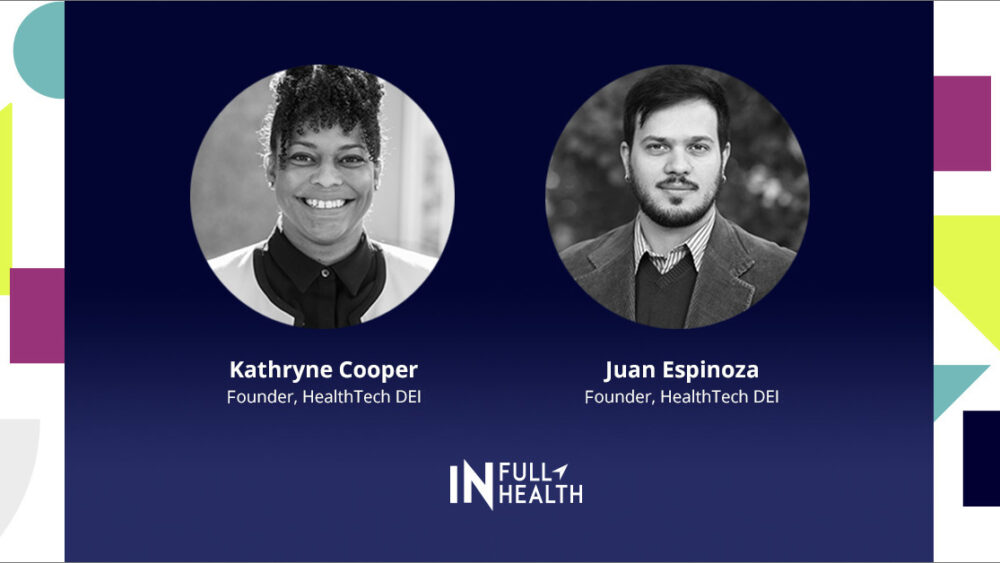Together, Kathryne Cooper and Juan Espinoza have dedicated their work and research to bringing diversity, equity, and inclusion to investment strategy — which has been embodied by their shared work at The West Coast Consortium for Technology & Innovation in Pediatrics (CTIP) and in the founding of HealthTech DEI.
In 2020, all of their insights and observations manifested in a groundbreaking report: “Identifying Evidence-based Strategies to Increase Diversity Among Funded Health Tech Founders.” In this report, they present a robust “overview of existing interventions from around the world intended to address the lack of diversity among funded health tech founders” in both health care and similar industries.
 In this deep dive into their Landscape Analysis, HealthTech DEI founders Kathryne and Juan speak about the importance of data and the future of equity in medtech investment.
In this deep dive into their Landscape Analysis, HealthTech DEI founders Kathryne and Juan speak about the importance of data and the future of equity in medtech investment.
In Full Health (IFH): Your professional partnership spans over a decade — how did this relationship fuel your work on the landscape analysis?
Juan Espinoza: Kathryne and I were both first-year medical students at the University of Southern California Keck School of Medicine when we met. We’ve worked together on everything from planning spring break trips to funding federal grants and everything in between. We know how each other works.
Kathryne Cooper: It’s fantastic to work on and carry audacious goals with someone that you trust professionally and personally, and who also has the same intrinsic motivation to change the overall capital allocation industry.
I think shared motivation is really important because that’s what gets you through any type of work. It’s also simpler to work with someone you’ve worked with for a really long time. We can do everything from very effective zoom meetings to in-person meetings. We’ve even coined the text message meeting, and it’s incredibly efficient, but it only works with someone that you’ve worked with for a while.
 The Principles For Equitable Health Innovation Principle #3
The Principles For Equitable Health Innovation Principle #3
Greater investment is needed in health innovations developed specifically to improve health in and/or eliminate inequities experienced by historically marginalized communities, with resources and support prioritized for innovators designing from within these communities.
IFH: What drove you to write this landscape report? What gap did you see — and strive to articulate — at this intersection of medical technology, equity, and venture capital?
Kathryne Cooper: In 2020, specifically after the murder of George Floyd, there was this increased scrutiny and attention within the venture capital industry on that drastically unequal distribution of capital in terms of the founders that are venture capital-backed. I think folks asked themselves, “Why? Why does this happen? Why is this continuing to happen? Do we need to do anything? If so, what do we do to fix this?” And many of those solutions were focused on the founders themselves. As if fixing the founders was the answer. Offers of mentorship and office hours exploded. And the question is, “Is that the best use of resources, and, if so, for which founders at which stage? And, most importantly, does that program, initiative, or strategy ultimately result in increased venture capital funding?”
So, we asked ourselves these questions, and we decided we should actually find the answer in an evidence-based, systemic, academic way. We’re nerds at heart. We like research. And so the point of the report is, “What are the evidence-based strategies that resulted in increased funding for Black, Latinx, and female health tech founders by venture capital?”
IFH: Why are the strategies outlined in the landscape analysis so important?
Kathryne Cooper: Increasing the diversity among funded health tech founders will lead to outsized investment returns for those investors. And it will fund the solutions of the future, which will have a long-term impact on patients and health care outcomes. Essentially you’re leaving both money and solutions on the table if you’re not funding all of the best ideas and companies.
Juan Espinoza: This report isn’t about charity or philanthropy. There are incredibly good, talented, impactful companies with Black, Latinx, and female founders, but many times they become missed investment opportunities — which is unfortunate, because there is significant ROI there. They’re strong investments. This isn’t social justice investing, it’s just good investing. And it also happens to have an equity and social justice benefit to it.
SUBSCRIBE
Stay in the loop about new blog posts from equitable health innovation leaders, helpful resources and tools to help you bring the Principles to life, upcoming events, and more by joining our email list.
SUBSCRIBEIFH: How do you hope this report can be utilized to advance equity in health innovation?
Kathryne Cooper: People should read the report and reflect upon the content, particularly how the strategies covered in the landscape analysis can be utilized or are being utilized in their day-to-day work. Then ask yourself, “Are those the most effective ways to impact equitable resource allocation?”
The report is an exercise to then ask yourself what your next step should be. It’s not a direction or a guide. It’s an overview of various strategies that have been used in capital, networks, and metrics. And then, it prompts you to think, “How can you implement some or all of those strategies, or are they being implemented already?”
IFH: What advice do you have for people who might just be starting out in this work/space?
Juan Espinoza: The reality is that there are no magic tricks, and there are no shortcuts. There’s just good, hard, obvious work that people need to do. That is the first thing I would say.
The second is that you have to commit. Because the moment you start this process, you immediately realize how many other things about your operation have to change. Internally as an organization, you have to be prepared to understand and follow the ripples that this will cause to the rest of your organization.
The third — and maybe this is my bias because I’m an informaticist — is that I do genuinely think that you don’t know what to do or where you need to focus until you have data. So the first and foremost thing is you have to create a mechanism to collect, review, and act on data. Otherwise, how will you know that anything worked?
IFH: Has there been any update to this work since 2020 — what has changed or hasn’t changed since then?
Kathryne Cooper: I think to some extent, looking at year-over-year change distracts from the gravity of the issue. Relative capital allocation is essentially unchanged. In 2021, Black founders received 1.3% of all venture funding in the U.S. compared to 1% in 2019. So we’re talking about a difference from 1% to 1.3%. So you could say, “Funding hit a record high,” but that’s still distracting you from the other 98% of capital.
Juan Espinoza: The magnitude of the gap is such that any incremental change in either direction kind of doesn’t matter — which is a very depressing way to think about it, but it’s also the most realistic. And it’s hopefully the way to think about it that brings about that intentionality.
Kathryne Cooper: Because of the massive magnitude of the problem, there needs to be multiple organizations and institutions thinking about and working at this in order to truly move the needle in a meaningful way so we don’t have to be talking about basis points and rounding errors of a percentage.
Expressing Gratitude
This work and this report would not have been possible without the hard work of so many people. Thank you to Charlotte Cramer and Monica O’Malley de Castillo, CTIP, Children’s Hospital Los Angeles’ Innovation Studio, and of course The California Health Care Foundation for funding this work. We also want to thank our network of supporters and collaborators: anyone we bounced ideas off of, thought partners, people who connected us to someone else — thank you.
Kathryne Cooper and Juan Espinoza
Founders, HealthTech DEI
IFH: What’s next? What opportunities do you see to build on this landscape analysis?
Kathryne Cooper: HealthTech DEI is collaborating with the In Full Health community, which we are excited to do. We are thrilled to break down the landscape analysis into digestible bites alongside In Full Health and to then share that with the Learning & Action Community.
We’re also working with the American Medical Association on leading community conversations with capital allocators around the themes in the report and how they can take actual steps at their organizations and institutions. We love the work to do at HealthTech DEI and if you’re interested in working with us, you can get in touch via our website.
SUBSCRIBE
Stay in the loop about new blog posts from equitable health innovation leaders, helpful resources and tools to help you bring the Principles to life, upcoming events, and more by joining our email list.
SUBSCRIBE


Comments are closed.